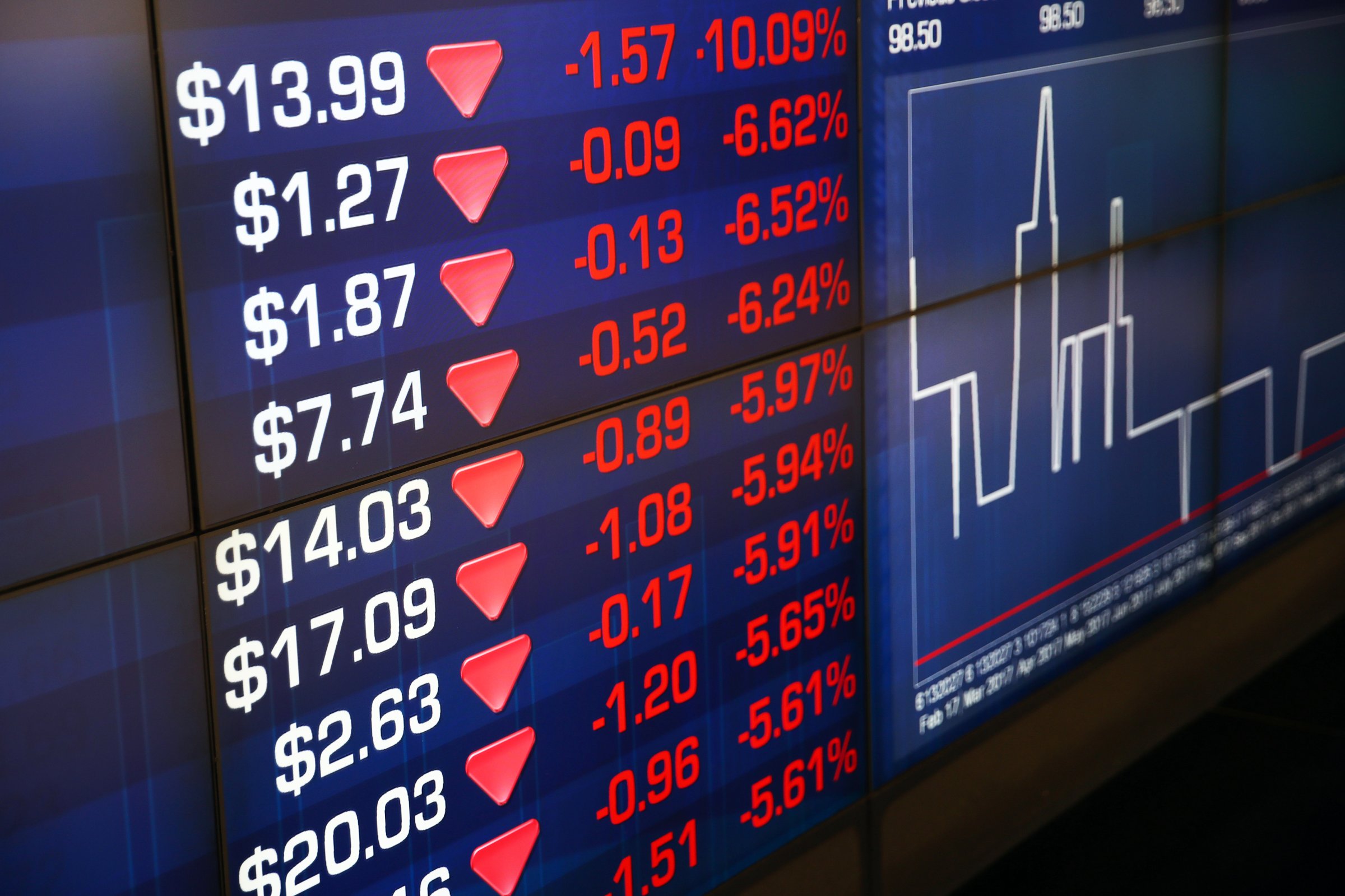
The global equity rout extended on Tuesday as a gauge of world stocks headed for the biggest three-day slide since 2015. U.S. shares were poised for more losses, with a measure of volatility spiking to the highest in nine years. Treasuries fell and the dollar rose.
Futures for both the S&P 500 Index and the Dow Jones Industrial Average fluctuated throughout the European session before heading lower. The Cboe Volatility Index popped above 50 for the first time since 2015, sending exchange-traded products tied to the measure on a wild ride.
The Stoxx Europe 600 Index at one point slumped the most since June 2016, with every industry sector falling as much as 2 percent. Japan’s Nikkei entered a correction as most of the shares on the 1,000-plus member MSCI Asia Pacific Index declined. Amid the sea of red, core European bonds advanced while Treasury yields swung.
What began with rising bond yields has become a selloff across global equity markets, as investors fret the return of inflation and higher rates that could erode profitability for companies already trading at elevated valuations. Traders will be watching how the moves unfold from here — a sustained stock slump has the potential to undermine consumer and business sentiment, crimp borrowing and so start to curtail global growth.
“Global equities did not experience any material weakness for nearly two years, valuations have become stretched and technical, positioning and sentiment indicators all flashed red in recent weeks,” said Emmanuel Cau, equity strategist at JPMorgan Chase & Co. “The unwinding of this extreme bullishness could have a bit more to go in the near term.”
As assets decline, volatility is surging, causing pain for investors who had positioned for price swings to remain muted. Trading was halted in some exchange-traded products used to bet against volatility, and the VIX Index was set for the highest close since 2009.
Elsewhere, oil slumped for a third day and metals joined the selloff after gaining on Monday. Bitcoin erased losses to trade above $7,000 after at one point trading below $6,000 for the first time since October.
Here are some key events scheduled for this week:
Monetary policy decisions are due in Russia, India, Brazil, Poland, Romania, the U.K., New Zealand, Serbia, Peru and the Philippines. Earnings season continues with reports from Walt Disney, SoftBank, Sanofi, Philip Morris, Total, Tesla, Rio Tinto, L’Oreal and Twitter. Dallas Fed President Robert Kaplan and New York Fed President William Dudley are among policy officials due to speak in Frankfurt and New York.These are the main moves in markets:
Stocks
The Stoxx Europe 600 Index decreased 2.3 percent as of 8:13 a.m. New York time, hitting the lowest in more than five months with its seventh consecutive decline and the largest dip in more than 19 months. Futures on the S&P 500 Index fell 0.4 percent to the lowest in almost 11 weeks. The MSCI Asia Pacific Index sank 3.6 percent to the lowest in almost six weeks on the largest tumble in more than 19 months. The U.K.’s FTSE 100 Index dipped 2 percent, reaching the lowest in almost 10 months on its sixth consecutive decline and the biggest decrease in almost 10 months. The MSCI Emerging Market Index sank 3.1 percent to the lowest in five weeks on the largest tumble in more than 19 months.
Currencies
The Bloomberg Dollar Spot Index increased 0.4 percent to the highest in more than two weeks. The euro decreased 0.3 percent to $1.2327, the weakest in two weeks. The British pound dipped 0.7 percent to $1.3867, the weakest in more than two weeks. The Japanese yen declined 0.4 percent to 109.50 per dollar. South Africa’s rand jumped 0.6 percent to 12.0541 per dollar. The MSCI Emerging Markets Currency Index fell 0.2 percent to the lowest in two weeks.
Bonds
The yield on 10-year Treasuries climbed two basis points to 2.73 percent. Germany’s 10-year yield declined five basis points to 0.69 percent, the lowest in a week on the largest drop in more than two months. Britain’s 10-year yield fell four basis points to 1.514 percent, the biggest fall in almost five weeks.
Commodities
West Texas Intermediate crude dipped 1.3 percent to $63.34 a barrel, the lowest in more than two weeks. Gold fell 0.4 percent to $1,334.96 an ounce.Terminal users can read more on the slide in stocks in other Bloomberg stories: Hedge Funds Now Look Prescient After Cutting Short-Vol Bets Volatility-Targeting Funds Could Sell $225 Billion of Stocks ‘Buy the Dip’ Takes Hold at Allianz to JPMorgan as Rout Deepens As Investors Raced to Hedge, ETF Options Trading Beat ETFs Volatility Jump Has Traders Asking About VIX Note Poison Pill VIX-Related ETPs Go Wild in After-Hours Trading After Rout VIX at 38 Is Waterloo for the Beloved Short Volatility Trade
More Must-Reads From TIME
- The 100 Most Influential People of 2024
- The Revolution of Yulia Navalnaya
- 6 Compliments That Land Every Time
- What's the Deal With the Bitcoin Halving?
- If You're Dating Right Now , You're Brave: Column
- The AI That Could Heal a Divided Internet
- Fallout Is a Brilliant Model for the Future of Video Game Adaptations
- Want Weekly Recs on What to Watch, Read, and More? Sign Up for Worth Your Time
Contact us at letters@time.com